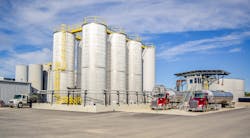Paving the way: Asphalt Materials grows despite challenges
Recent construction industry updates from the Associated General Contractors of America (AGC) haven’t been constructive.
The association last month reported that construction employment decreased from March 2020 to March 2021 in 203 of the nation’s metro areas, or 57%, according to its analysis of government employment data; and that an “unprecedented leap” in the price of goods used in construction and supply-chain disruptions are “wreaking hardships” on contractors, and slowing projects across the country.
But at least one bulk fleet serving the sector continued to grow during the pandemic.
Asphalt Materials Inc. (AMI), a subsidiary of family-owned The Heritage Group, added three asphalt terminals in a November 2020 deal with Marathon Petroleum, which was its third acquisition in the last two years; and has grown its trucking operations to more than 400 vehicles, including 270 tank trailers, 100 tractors and 50 straight trucks, in what logistics director Tyler Trent calls tenfold growth over the last 24 months.
They’re also planning to stay plenty busy throughout the summer.
“I expect that, come May 31, on Memorial Day, when we kick off the season, we’ll start getting increasingly busier and busier up until hitting our peak in August,” Trent said. “And then after we peak in August, we’ll start tailing back down again, and working our way into the winter months.”
Mixed results
The Houston, Texas, area lost the most construction jobs from March 2020 to March 2021, shedding 31,000 jobs, or 13% of its pre-pandemic total, according to AGC, followed by New York City (-24,000 jobs); Midland, Texas (-10,000); and Odessa, Texas (-8,000). And, according to Ken Simonson, the association’s chief economist, “nonresidential construction is still at risk of further declines in much of the country.”
Only 104 out of 358 metro areas added jobs during the 12-month period, while construction employment was stagnant in 51 metro areas. The Seattle, Wash., area gained the most construction jobs (5,300) during the period.
Association officials added that construction firms are being squeezed by rapidly rising materials prices while they are unable to charge more for construction projects amid broader market uncertainties caused by the pandemic.
“Construction employment is not going to rebound in many parts of the country while firms are struggling to afford the materials they need to complete existing projects,” said Stephen E. Sandherr, the association’s chief executive officer. “Once federal officials take immediate and effective steps to address both spiking prices and lagging demand, employment levels should rebound in more of the country.”
Prices for materials and services used in construction and contractors’ bid prices both declined at the beginning of the pandemic but have diverged in the past year, Simonson said. A government index that measures the selling price for goods used in construction jumped 3.5% from February to March, and 12.9% since March 2020. Both increases were the highest recorded in the 35-year history of the series, he noted.
Meanwhile, the producer price index for new nonresidential construction—a measure of what contractors say they would charge to erect five types of nonresidential buildings—increased only 0.5% last month and 1.7% over the past 12 months.
“These material cost increases—steep as they are—tell only part of the story,” Simonson added. “They are based on prices the government collected a month ago, and they fail to capture the notices contractors are receiving daily about longer lead times, shipments held to a fraction of previous orders, and other challenges.”
Association officials said some of the supply chain problems are being caused by the pandemic, which is leaving manufacturers and shippers shorthanded amid growing demand for a host of products. But they added that federal policies, particularly tariffs and quotas on key building materials like lumber and steel, also are contributing to price spikes, supply shortages and delivery delays.
“The Biden administration must address soaring lumber and steel costs and broader supply chain woes with the same energy they are putting into dealing with shortages of automotive microchips,” Sandherr said. “Without tariff relief and other measures, construction employers will have little ability to invest in new equipment and hire new employees.”
But in more positive news, the U.S. Census Bureau said construction spending in February was up 5.3% year-over-year, with $1,516.9 billion, compared to $1,441.1 billion in February 2020. During the first two months of 2021, construction spending amounted to $213.2 billion, 4.9% above the $203.2 billion for the same period in 2020.
And AMI, whose logistics division hauls essential asphalt and emulsions primarily for commercial construction markets, saw only minimal pandemic impact on its business, while maintaining growth through acquisitions. Trent said they saw increases in some grades of product, and decreases in others, as customers adjusted budgets, but overall product demand remained flat—which is good considering the current climate.
“You always want growth, and you take growth however you can get it, but being in a pandemic, and seeing all these other industries begin to fail, it’s a pretty nice spot to be in, in the construction industry, knowing we were much less impacted,” Trent said.
Swelling fleet
AMI parent The Heritage Group, run by a fourth-generation family member, CEO Amy Schumacher, last year celebrated its 90th anniversary. Founded by John E. Fehsenfeld with one truck he used to deliver home heating oil during the Great Depression, the company now operates more than 30 subsidiaries and employs more than 5,000 people.
Asphalt Materials is part of the Heritage Construction & Materials division, and underneath AMI’s umbrella are J-Band, Henry G. Meigs (HGM), Emulsicoat, Bituminous Materials & Supply, Tri-State Asphalt, ProTack, and Pavement Maintenance Systems. Combined, AMI boasts 26 plants with loading racks and product tanks across its seven different brands in Illinois, Indiana, Iowa, Kentucky, Michigan, Ohio and Wisconsin.
The company strictly is The Heritage Group’s liquid supplier. Customers pick up product at an AMI terminal, or receive it via delivery from one of AMI’s company-owned and contract-carrier trucks and trailers. AMI’s Tama, Iowa Bituminous Materials location runs a fleet of 12 trucks and 28 tank trailers, the Morris, Illinois Tri-State Asphalt and ProTack location boasts 27 trucks and 56 tank trailers, the Abbotsford, Wisconsin HGM operation includes 16 trucks and 32 tank trailers, and the Portage, Wisconsin HGM plant has 17 trucks and tank trailers.
Straight trucks with tanks are used for distribution and application of ProTack emulsions.
AMI’s asphalt tankers from Etnyre include 7,000- and 7,500-gallon, tandem-axle trailers, with a mix of stainless steel and aluminum constructions. “We pride ourselves in our relationships as a business entity, and Etnyre has a quality product,” Trent said. “They’re also involved in building equipment for some of our other Heritage Group companies.
“We’re keeping efficiency and safety in mind with the trailers we’re moving to now. So, from an efficiency perspective, we’re going with aluminum barrels, and taking some weight off of the trailer to help reduce some of our operating costs. We’re also installing lift axles to try to save some rubber as we go down the road.”
The company’s trucks are a “mixed bag” of makes added through acquisitions. Trent said operations in Wisconsin, Iowa and Illinois all came with different trucks, and different specs, so he’s currently looking to standardize. “That way our mechanics in different states can work on any of the trucks,” he said. “And as our trailers and trucks get more in line with specs, you don’t have to worry about sliding axles or sliding fifth wheels. Your truck and trailer units are set up to load the same every time you go through the process.”
Under construction
Trent expects the equipment standardization process to occur over the next five to 10 years as the company decides how best to invest in its fleet. Key considerations are safety, telematics, lightweighting for payloads, and fuel efficiency.
Rapid growth also comes with other challenges, like streamlining processes, Trent said. Fortunately, AMI retained most of the employees it added through acquisitions.
“The biggest thing we’re working on is how do we focus on centralized compliance,” he said. “I want my Wisconsin compliance running exactly like my Iowa and Illinois compliance. So how do we put those platforms in place to be able to manage that from corporate, as well as our boots on the ground out at the facilities.”
In the short term, he’s more concerned with serving customers this summer.
Doing so includes enlisting the services of nearly 90 different carriers contracted throughout the Midwest during peak road-building season.
“A lot of our carriers are propane, butane and anhydrous haulers,” Trent said. “And when propane demand isn’t there, for grain drying—we had a dry summer last year, so there wasn’t as much propane being hauled—that’s a good opportunity for the construction industry to help fill that void, and provide year-round work.”
About the Author
Jason McDaniel
Jason McDaniel, based in the Houston TX area, has more than 20 years of experience as an award-winning journalist. He spent 15 writing and editing for daily newspapers, including the Houston Chronicle, and began covering the commercial vehicle industry in 2018. He was named editor of Bulk Transporter and Refrigerated Transporter magazines in July 2020.

